|
|
|
Sort Order |
|
|
|
Items / Page
|
|
|
|
|
|
|
| Srl | Item |
| 1 |
ID:
144289
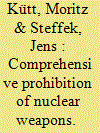

|
|
|
|
|
| Summary/Abstract |
There have been calls for the abolition of nuclear weapons from the day they were invented. Over the last fifteen years, some indications can be found that such calls have been getting louder, among them Barack Obama's famous 2009 speech in Prague. In this article, we investigate if support for a comprehensive norm that would prohibit development, possession, and use of nuclear weapons is really growing. To assess the current status of that norm, we use the model of a “norm life cycle,” developed by Martha Finnemore and Kathryn Sikkink. We then analyze 6,545 diplomatic statements from the review process of the Treaty on the Non-Proliferation of Nuclear Weapons as well as from the UN General Assembly First Committee on Disarmament and International Security, covering the years 2000 to 2013. The evidence shows that a comprehensive prohibition can be considered an emerging international norm that finds growing support among states without nuclear weapons and nuclear weapon states alike. Only a core group of states invoke the norm consistently, however. This leads us to conclude that the “tipping point” of the life cycle, at which adherence to a new norm starts to spread rapidly, has yet to be reached.
|
|
|
|
|
|
|
|
|
|
|
|
|
|
|
|
| 2 |
ID:
138081
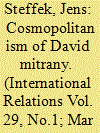

|
|
|
|
|
| Summary/Abstract |
In this article, I engage with the normative foundations of David Mitrany’s international political theory. My aim is to show that there is more to be found in Mitrany’s approach to international organization than the technocratic problem-solving often associated with his name today. To pinpoint the essence of Mitrany’s normative thought, I introduce the term ‘functional cosmopolitanism’. This variety of cosmopolitan theorizing starts from the equality of individual needs (not from rights or obligations), suggesting that transnational institutions, rather than states, should cater to these needs. An important aim of this ‘functional devolution’ is to limit and reconfigure public power, thus countering the threat of an ever more powerful nationstate. Mitrany’s proposal for introducing a functional dimension into the political system can be interpreted as a ‘thin’ cosmopolitanism, designed to free citizens from war and oppressive concentrations of political power, but vague in its ideas about individual political engagement.
|
|
|
|
|
|
|
|
|
|
|
|
|
|
|
|
| 3 |
ID:
144050
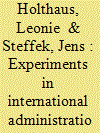

|
|
|
|
|
| Summary/Abstract |
In this article, we reintroduce the political thought of James Arthur Salter (1881–1975), a British diplomat, politician, and university professor, who made a seminal contribution to the emergence of International Relations theory in the interwar years. His academic writings were informed by his professional engagement with the Allied Maritime Transport Council (AMTC) during the First World War and the technical branches of the League of Nations. Salter promoted a distinctly transgovernmental form of expert cooperation in international advisory bodies connected to national ministries. His vision of a depoliticised transnational expertocracy inspired various IR functionalists, not least David Mitrany. Salter suggested such forms of governance also for British national politics, drawing what we call here an ‘international analogy’. His work illustrates very well how the emergence of IR theory was connected to broader trends in political theory, in particular in efforts at adapting democracy to the increasing complexities of industrial modernity.
|
|
|
|
|
|
|
|
|
|
|
|
|
|
|
|
| 4 |
ID:
123400
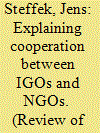

|
|
|
|
|
| Publication |
2013.
|
| Summary/Abstract |
The ever closer collaboration between intergovernmental organisations (IGOs) and non-governmental organisations (NGOs) is empirically well described but poorly theorised. In this article I develop a general theoretical framework for analysing emergent patterns of cooperation between IGOs and NGOs, which may be used to generate hypotheses or guide comparatives studies. The starting point is a conception of organisational actors as purposeful but resource-dependent. The article then combines a 'resource exchange perspective' from organisational sociology with the model of a policy cycle from comparative politics. The result is a theoretical framework that allows to identify incentives for, as well as obstacles to, IGO-NGO cooperation along all phases of the policy cycle. In a concluding section the limits of this model and the underlying assumptions are discussed.
|
|
|
|
|
|
|
|
|
|
|
|
|
|
|
|
| 5 |
ID:
141213
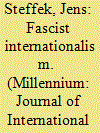

|
|
|
|
|
| Summary/Abstract |
In 1934, the Italian diplomat and scholar Giuseppe de Michelis (1872−1951) published a programmatic book that in English was called ‘World Reorganisation on Corporative Lines’. In this study, de Michelis suggested transferring the socio-economic model of fascist Italy to the global level. He thus envisaged global economic governance by a powerful international organisation and a strict limitation of national sovereignty over the factors of production. My purpose in this article is to explore these largely forgotten proposals as well as the ideological context from which they emerged. The fascist internationalism of de Michelis was technocratic and dirigist, enthusiastic about the possibilities of public planning and the virtues of bureaucratic organisation. This is why his suggestions resembled, in some important respects, world order proposals made by liberal internationalists during the same period. The lesson for International Relations theory is that blueprints for international institutions can be connected to a wide variety of political ideologies. There is no reason to believe that any tradition of political thought is necessarily and eternally committed to internationalism, while others are principally hostile to it.
|
|
|
|
|
|
|
|
|
|
|
|
|
|
|
|
| 6 |
ID:
153902
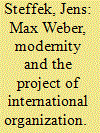

|
|
|
|
|
| Summary/Abstract |
In this essay I discuss programmatic proposals for international organization in the light of Max Weber's account of modernity. I argue that the authors known in international relations (IR) as ‘functionalists’ have pursued the extension of the modernization process that Weber analysed in national societies into the international sphere. Between 1900 and 1945, functionalists advocated a transformation of international politics, at that time still the domain of a lot of jingoism and aggression, into rational public administration. In the first part of the article I outline Weber's account of societal modernization with a focus on the sharp contrast between politics and bureaucratic administration. In the second section I engage with the writings of three political scientists who represent the early ‘functionalist’ tradition in IR: Paul Reinsch, James Arthur Salter and David Mitrany. I show how they planned to modernize IR by establishing a technocratic mode of governance and hence a Versachlichung der Gewaltherrschaft, that is, a depersonalization and rationalization of authority. The turn to international organizations in the early twentieth century thus can be seen in the context of the universal process of societal modernization as rationalization that Weber analysed.
|
|
|
|
|
|
|
|
|
|
|
|
|
|
|
|
|
|
|
|
|